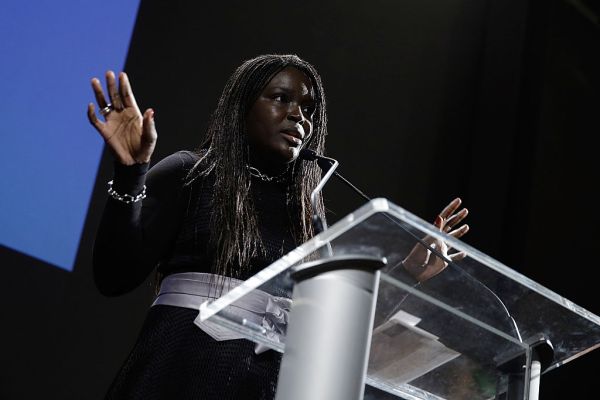It had to be “Memory.”
Donald Trump’s most recent Joe-Biden-on-LSD performance was at a town hall meeting—it was supposed to be a town hall meeting, anyway—in Pennsylvania. He took a few questions and, this being a Trump event, a few fans had to be carried out after fainting. And Trump just stopped talking. “Who the hell wants to hear questions, right?” he asked of nobody in particular.
And then, the weird scene took a turn for the weirder.
For the next 40 minutes, Trump swayed on stage, bobbing and dancing a bit, with the crowd glumly filing out while the DJ worked his way through Trump’s by-now-familiar personal playlist: “YMCA” for all those totally normal heterosexual alpha males out there fainting in the audience, “Nothing Compares 2 U,” “An American Trilogy,” etc.
And, of course, “Memory.”
“Memory,” the big show-stopper from Cats, is a Trump favorite. It is the song that aides play for Trump when he is having a temper tantrum and needs to be calmed down like the senescent toddler he is. It is a strange little song, part of a strange musical with a strange backstory. Andrew Lloyd Webber and Trevor Nunn put the song together around fragments (oh, the irony!) of a couple of T. S. Eliot poems, “Rhapsody on a Windy Night” and “Preludes.” Eliot’s widow, Valerie, was sensitive about her role as her late husband’s literary executor (she had been a secretary at Faber & Faber, was 40 years younger than Eliot, and was seen by many in his circle as having been a kind of trophy wife, unqualified to manage his literary affairs) but also wanted to make some money. Mrs. Eliot heard “Memory,” and approved of it, but also stipulated that the rest of Cats consist only of the words written by Eliot himself in Old Possum’s Book of Practical Cats (including some previously unpublished portions) and adapted, if at all, with the very lightest and most respectful touch. The result is that “Memory” is the only song from Cats that anybody knows—and is the reason Cats has so little of what you might call a plot.
“Trump remains a kind of pathetic figure with his nose pressed up against the window, looking in on a scene from which he remains excluded.”
“Memory” is a song sung by Grizabella, an old, worn-out cat at the end of her life, who had once been beautiful and glamorous before sinking into a life of destitution and (as Eliot alludes to obliquely) prostitution. It would have been the perfect song for Hillary Rodham Clinton—who once had the kind of glamor politicians have before fading. But you also can see the allure to such a man as Donald Trump. Even though he had always been the “short-fingered vulgarian” of Graydon Carter’s biting estimate, he had been a genuine celebrity, too, and a glamorous cat, in his way. Today, he is a felon, back to hawking Bibles and crypto and other low-rent scams, and—even though he very well may be elected president again—he is one of the most despised men in America and in the world.
His base of support is a personality cult composed of rubes and marks of precisely the kind he always has held in plain contempt, while the sort of people he always has aspired to associate himself with—think of Taylor Swift—are disgusted by him. (I think of William F. Buckley Jr.’s bitter observation that it seemed like half of National Review’s subscribers lived in Arkansas.) Trump remains a kind of pathetic figure with his nose pressed up against the window, looking in on a scene from which he remains excluded, standing there like a sad clown in his $10,000 Brioni suit.
And so the song rises in his heart:
Memory, all alone in the moonlight.
I can dream of the old days.
Life was beautiful then.
I remember the time I knew what happiness was.
Let the memory live again.
But Trump is not lost in the swirl of the surreal pageant of Cats. He is stuck in the middle of Krapp’s Last Tape, a wretched old man trapped in his failing brain, a memory in disordered fragments rather than the clenched fist of “Memory” that Grizabella raises against her loneliness and decay.
“Strange how potent cheap music is,” Noël Coward once marveled. (And he would have known.) Now, I am not sure that very many he-man regular-dude alpha male duck-huntin’ types have a Broadway number that sums up their lives in quite the way “Memory” seems to for Donald Trump, and I also think that some of Kamala Harris’ critics probably ought to go easy on the “low-T” line of opprobrium. But, having some association (now very much former, it occurs to me) with theater myself, I get it. I hear some of the songs from, say, Bloody Bloody Andrew Jackson and Hamilton in my own voice, as it were. And maybe it’s true, as Rodgers and Hammerstein insisted, that, if you keep the faith, then “You’ll Never Walk Alone.” I’d like to think so. But, most of the time, I’m just “Finishing the Hat.”
And there’s poor Donald Trump—who, as evinced by his recent lapse into a fugue, is no more able to do the job of president than ailing old Joe Biden is. He is only another Grizabella, alone, his overlong red tie pointing in Freudian fashion to the locus of his troubles. What to make of such a man? What to make of such a theatrical figure? Trump is a profoundly stupid man, obviously, and, as the sage said, life is hard when you’re stupid, even if you are rich and famous. If it turns out that Trump is, in fact, too profoundly stupid even to be ashamed of himself and what he has made of his life and of all that had been given to him, then I suppose that is a kind of mercy—the right kind of mercy for Donald Trump.







Please note that we at The Dispatch hold ourselves, our work, and our commenters to a higher standard than other places on the internet. We welcome comments that foster genuine debate or discussion—including comments critical of us or our work—but responses that include ad hominem attacks on fellow Dispatch members or are intended to stoke fear and anger may be moderated.
With your membership, you only have the ability to comment on The Morning Dispatch articles. Consider upgrading to join the conversation everywhere.